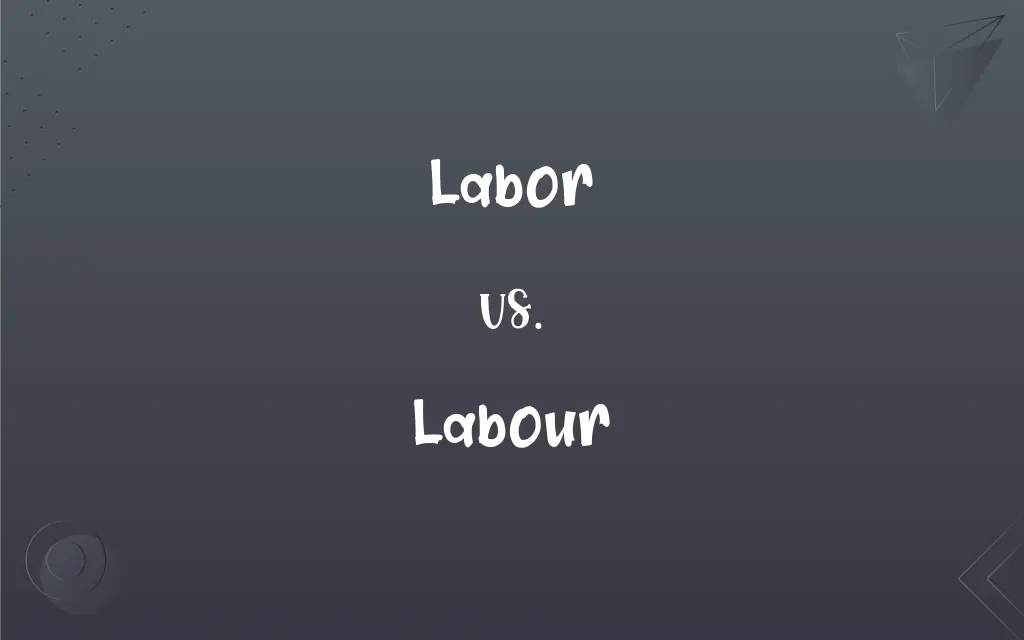Labor vs. Labour: What's the Difference?
Edited by Aimie Carlson || By Harlon Moss || Updated on October 15, 2023
"Labor" is the American spelling, and "labour" is British, both mean work, especially hard physical work.

Key Differences
"Labor" represents the American English spelling of the term, signifying the exertion of effort or work, especially that which requires physical prowess or is related to a specific task or job. Conversely, "labour" maintains the same definitional properties but is distinguished by its usage predominantly in British English territories, reflecting the same commitment to task or the process of working, albeit with a different orthographic representation.
In the context of economics and sociology, both "labor" and "labour" refer to the working-class or to the workforce. However, "labor" is used in American contexts, such as when discussing labor unions in the United States, while "labour" would be used in similar discussions taking place in the UK, like when referring to the Labour Party or labour rights in Britain.
During discussions of childbirth, the term "labor" or "labour" is employed to describe the process leading up to the delivery of a baby. In American hospitals and literature, you'll read "labor," for instance, in phrases like "labor pains" or "going into labor." In contrast, British hospitals and texts would use "labour" in the same context.
"Labor" and "labour" can also be used as verbs, describing the act of working strenuously. For example, in the US, one might say, "He labored under the sun for hours," whereas, in the UK, it would be, "He laboured under the sun for hours," with the spelling shifting in tandem with the geographical linguistic norms.
The distinction in spelling between "labor" and "labour" reflects a broader theme in language where certain words have variations that are orthographically distinct depending on whether American or British English is being used. Despite this spelling discrepancy, the pronunciation remains largely the same, and both forms are understood internationally thanks to the widespread nature of English-language media.
ADVERTISEMENT
Comparison Chart
Spelling
American English
British English
Pronunciation
Remains the same
Remains the same
Usage in writing
Used in American publications and communications
Used in British publications and communications
Contextual usage
Found in American-context discussions (e.g., labor unions)
Found in British-context discussions (e.g., Labour Party)
International recognition
Recognized and understood globally
Recognized and understood globally
ADVERTISEMENT
Labor and Labour Definitions
Labor
Labor refers to work, especially hard physical work.
The construction workers were fatigued after a long day of labor.
Labour
Labour can denote the body of persons engaged in such activity, particularly the working class.
The new laws were introduced to improve conditions for labour.
Labor
Labor is used to denote the process of childbirth.
She was in labor for several hours.
Labour
Labour refers to work, especially manual work involving physical effort.
The workers were ready for a day of hard labour.
Labor
As a verb, labor means to work hard or toil.
They labored through the night to finish the project on time.
Labour
Labour is the term used for the process of childbirth in British English.
Her labour lasted for ten hours.
Labor
Labor can describe the workforce or working class in general.
The new policies were designed to protect the rights of labor.
Labour
As a verb, labour means to work hard or make great effort.
They laboured until dusk to set up the campsite.
Labor
Labor can also imply an arduous task or effort.
It was a labor of love to restore the old car.
Labour
Labour also suggests a task done with great effort or difficulty.
Writing the novel was a real labour of love.
Labor
Physical or mental exertion, especially when difficult or exhausting; work.
Labour
Variant of labor.
Labor
A specific task or effort, especially a painful or arduous one
"Eating the bread was a labor I put myself through to quiet my stomach" (Gail Anderson-Dargatz).
Labour
Effort expended on a particular task; toil, work.
FAQs
Can "labor" and "labour" be used interchangeably?
No, they are region-specific spellings. Use "labor" in American English and "labour" in British English.
What is the difference between "labor" and "labour"?
"Labor" is the American English spelling, while "labour" is the British English spelling of the same word, meaning work or effort.
Is there a difference in pronunciation between "labor" and "labour"?
No, the pronunciation is the same; it's the spelling that differs.
Are there any specific rules for choosing between "labor" and "labour"?
Use the spelling that corresponds to the variety of English you are writing in.
Is there a plural form of "labor" or "labour"?
The plural forms are "labors" in American English and "labours" in British English.
How do you decide which spelling to use in international documents?
In international contexts, choose the spelling based on the audience or the organization's preference.
Is one spelling more correct than the other?
No, both are correct in their respective regions.
Do "labor" and "labour" have synonyms in English?
Yes, synonyms include "work," "employment," "task," and "job."
Which countries use "labour" as the preferred spelling?
The United Kingdom, Canada, Australia, and many other English-speaking countries use "labour."
Are there any derivatives of "labor" or "labour" that have different spellings?
Some derivatives, like "laborer" (US) and "labourer" (UK), have distinct spellings.
Is there a historical reason for the difference between "labor" and "labour"?
The variation can be traced back to the development of American and British English spelling norms.
Are there any grammatical differences between "labor" and "labour"?
No, they are grammatically identical; the difference is in spelling only.
Which countries use "labor" as the preferred spelling?
The United States and some other English-speaking countries follow American English and use "labor."
Are there situations where "labor" and "labour" have different connotations or usage?
No, they have the same meanings and usage; only the spelling differs.
Is "labor" or "labour" used in the context of childbirth?
In both American and British English, "labor" is used to refer to the process of childbirth.
Are there any exceptions to the American/British English rule for "labor" and "labour"?
There are no major exceptions; the regional spelling is quite consistent.
Is one term more correct than the other?
No, the correct usage depends on whether American or British English is being used.
In legal contexts, is there a preference for "labor" or "labour"?
Legal documents in the United States generally use "labor," while those in the UK use "labour."
Is "labor" or "labour" more commonly used in academic writing?
Academic writing tends to follow the conventions of the country, so it depends on the academic institution's location.
Can you use "labor" or "labour" as a verb?
Yes, both can be used as verbs meaning to work or exert effort.
About Author
Written by
Harlon MossHarlon is a seasoned quality moderator and accomplished content writer for Difference Wiki. An alumnus of the prestigious University of California, he earned his degree in Computer Science. Leveraging his academic background, Harlon brings a meticulous and informed perspective to his work, ensuring content accuracy and excellence.
Edited by
Aimie CarlsonAimie Carlson, holding a master's degree in English literature, is a fervent English language enthusiast. She lends her writing talents to Difference Wiki, a prominent website that specializes in comparisons, offering readers insightful analyses that both captivate and inform.
































































